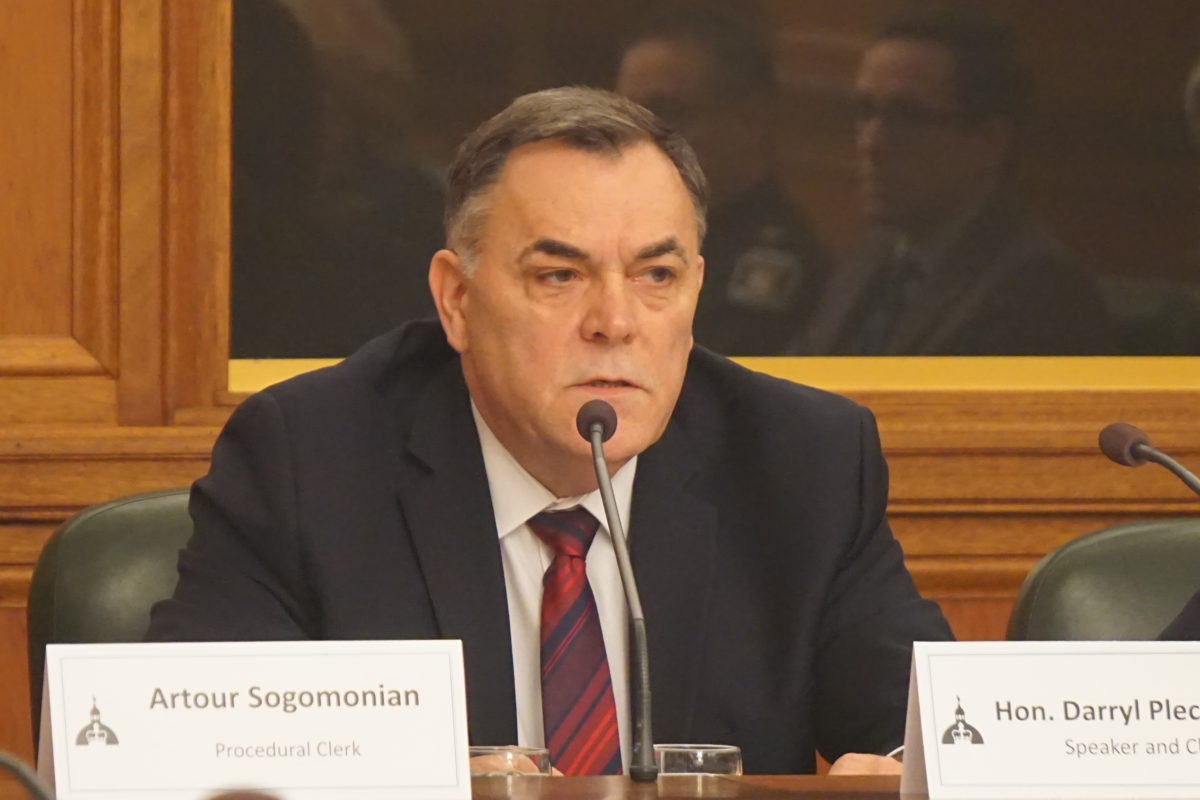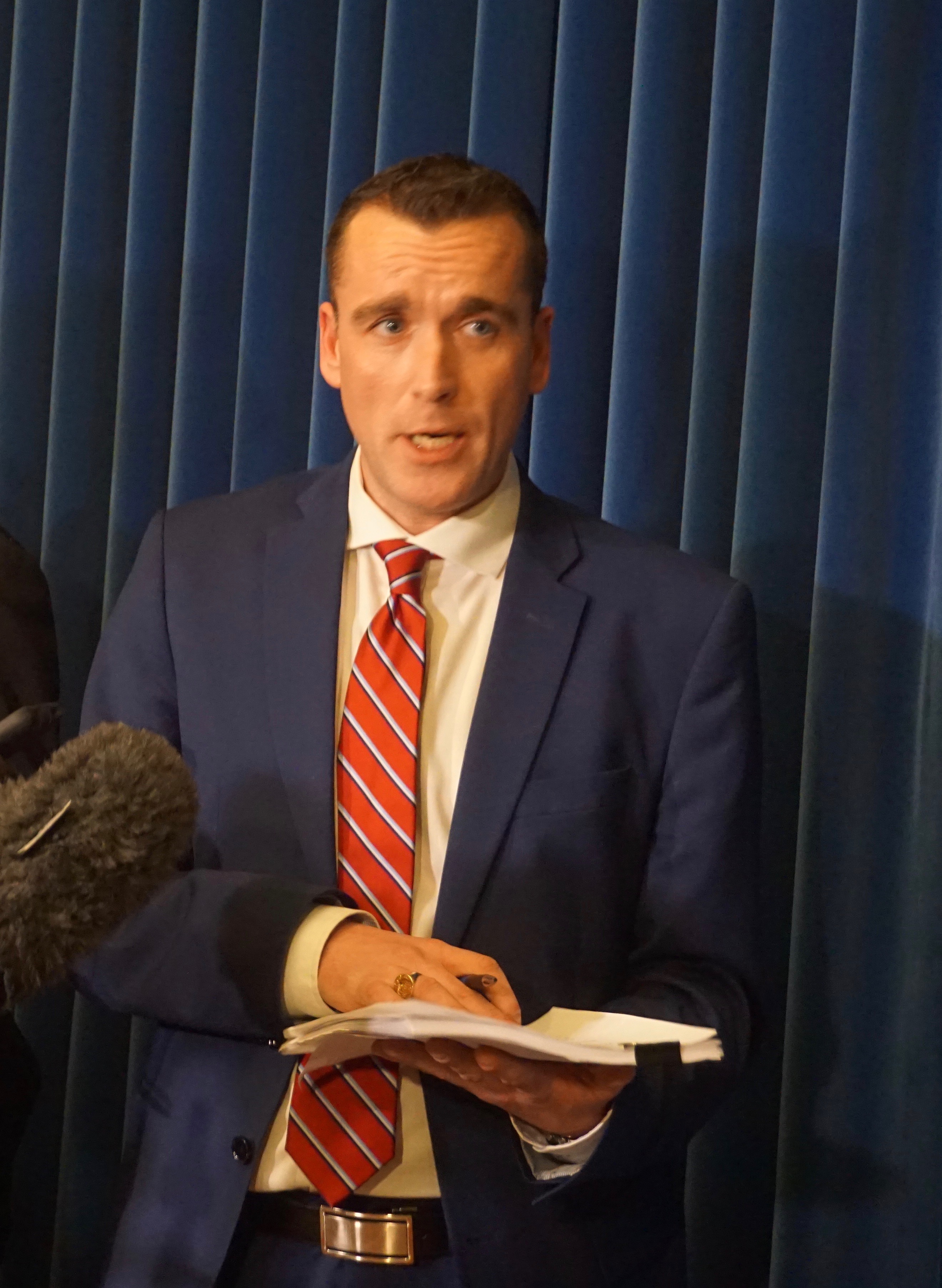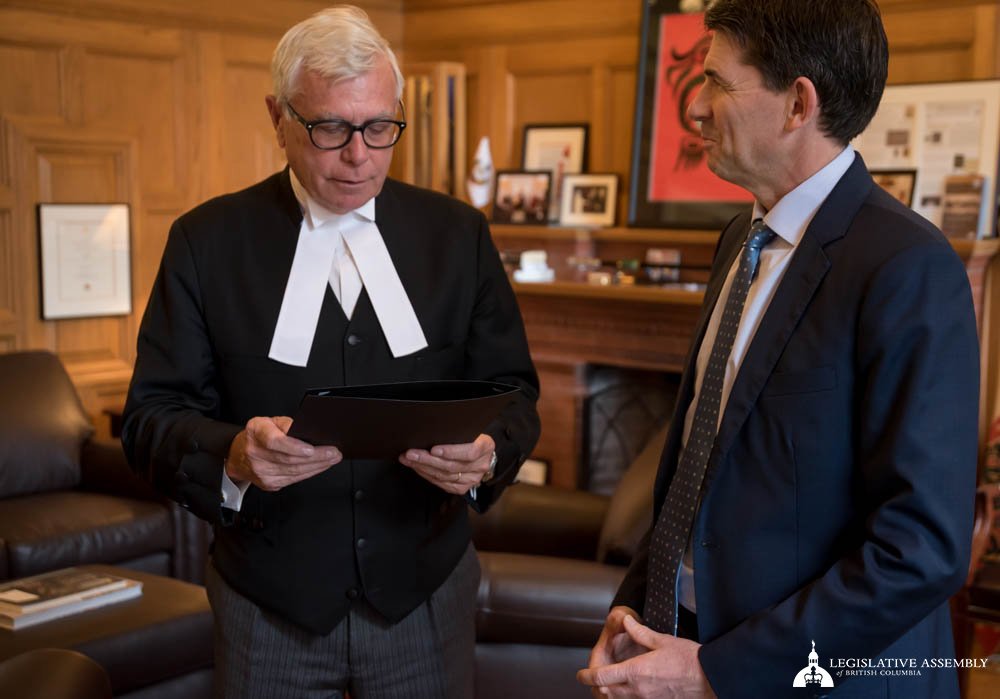
Bob Mackin
The devil is always in the details, but sunshine is finally coming to the British Columbia Legislature.
More than a quarter century after B.C.’s Freedom of Information and Protection of Privacy Act was passed by the Harcourt NDP, the Horgan NDP is poised to apply the law to the Legislative Assembly.
There are 2,900 provincial and municipal government offices, big and small, that are subject to the public records law. Such as provincial ministries and Crown corporations. Hospital authorities. City halls. Regional districts. School boards.
The Legislature, which spends more than $75 million of your money every year, is not one of them.

Alan Mullen, special advisor to Speaker Darryl Plecas, with the damning report on the suspended officials (Mackin)
Change is coming, not because the NDP is finally fulfilling election promises from 2017. It is because of the corruption unearthed by Speaker Darryl Plecas and his chief of staff, Alan Mullen in the damning Jan. 21 published report.
The tipping point was a Feb. 4 letter by three official watchdogs, who joined forces to call for the freedom of information law, whistleblower protection and merit-based hiring at the Legislature.
Information and Privacy Commissioner Michael McEvoy, Merit Commissioner Fiona Spencer and Ombudsperson Jay Chalke told the Legislative Assembly Management Committee that three “reasonable and common sense changes” would enhance accountability, transparency and good governance. (McEvoy’s contribution was previewed a week earlier, when theBreaker.news was first to report on his reaction to the Plecas Report on the suspended and under RCMP investigation clerk Craig James and sergeant-at-arms Gary Lenz.)
“Specifically, we urge all legislators to, in the public interest, enact a framework that ensures that the Legislative Assembly is subject to freedom of information law, offers statutory public interest disclosure recourse and protection to Legislative Assembly staff, and enables oversight of processes to ensure that Legislative Assembly staff are appointed on merit and dismissed only in accordance with fair dismissal practices,” they wrote in the letter, which they released on Feb. 5.
Their letter said the Legislature is a public institution like any other. It employs people, owns property, provides services and spends taxpayer dollars. “When it discharges these functions there is no policy reason to exempt it from accountability and transparency rules that apply to other public institutions.”
They made the case to reform laws, while allowing individual MLAs to carry-out confidential constituency work on behalf of citizens in need and for the Legislature to continue the privileged process of crafting bills.
Mike Farnworth, the Solicitor General and Government House Leader, was blunt, but vague, when he spoke to reporters in Victoria.
“Let me be really clear: Those three recommendations are going to be implemented,” Farnworth said.
When? Not overnight, he said. Farnworth said he would work with the watchdogs “as quickly as possible and get things done as soon as possible and work with them on what the appropriate timeline is.” The next Legislature session runs Feb. 12 to May 30.
It is long overdue. The NDP had eight more years in power after the FOI law came to be. The BC Liberals had 16 years and never did pierce the veil of secrecy, despite promising in 2001 to make the B.C. government Canada’s most open and accountable.

B.C. Information and Privacy Commissioner Michael McEvoy, sworn-in by Clerk Craig James in April 2018 (BC Leg/Twitter)
The Horgan NDP promised in the 2017 election to make FOI reforms, beginning with a Duty to Document law and fines for the destruction of records. We are now in 2019 and nothing has changed. In some cases, the NDP has taken steps backwards.
Farnworth’s words were the first, welcome words about transparency reforms of any type since the Horgan Horde was sworn-in July 18, 2017. They’re now aiming to take ownership of the issue, the week after BC Liberal leader Andrew Wilkinson proposed a 20-point accountability plan for the Legislature that crazily omitted FOI reform.
The executive director of the B.C. Freedom of Information and Privacy Association said this is “just one piece of the puzzle” in the struggle for reform.
“We continue to be in reactionary mode and we need to move a step further and be proactive,” said Sarah Neuert.
Neuert said the May 2016 report of the all-party Special Committee to Review the Freedom of Information and Protection of Privacy Act called for Duty to Document, penalties for interference, and to end exceptions and plug loopholes that public bodies often use to subvert the law.
“These comprehensive reforms are the only measures that will provide government transparency and establish a system of accountability that will prevent future government scandals from occurring,” she said.
Advocates for open government have good reason to be skeptical of the NDP’s intentions. On Feb. 5, when I contacted the offices of the Premier, Attorney General and Minister of Citizens Services (who is responsible for the operations of the government’s FOI department), nobody would answer if and when a Duty to Document bill would be tabled.
So, we can thank Plecas and Mullen for getting this far. Their work is bearing fruit.
It is time for Premier John Horgan to catch-up and fulfil his promises.
Support theBreaker.news for as low as $2 a month on Patreon. Find out how. Click here.











